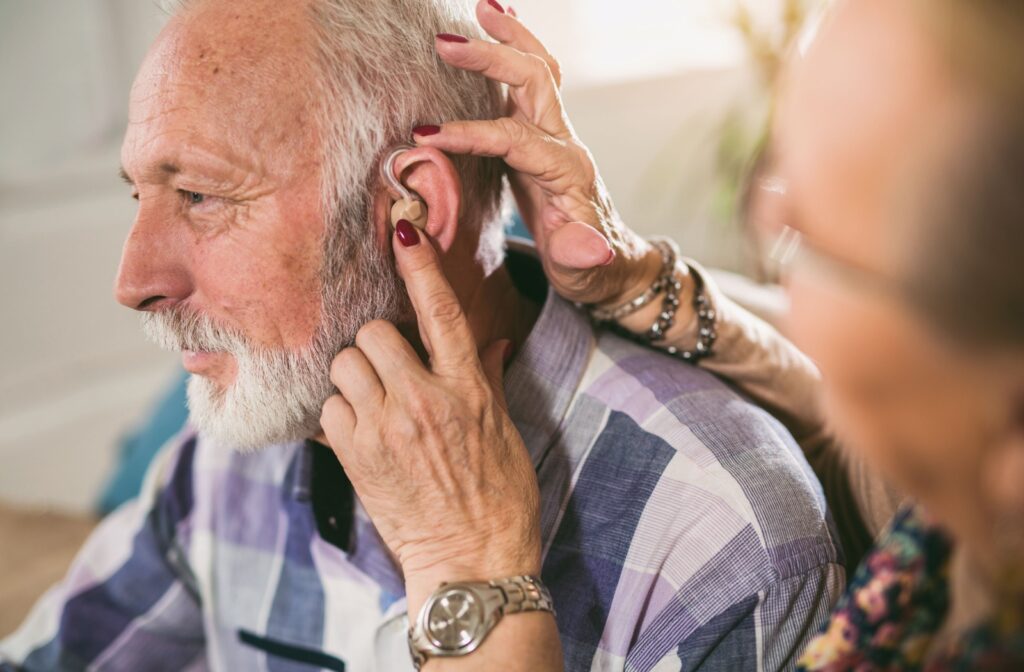Key Takeaways
- Different hearing aid styles serve different needs and comfort levels.
- Professional evaluations help determine the right type and features.
- Cost varies widely between prescription and over-the-counter options.
- Modern hearing aids offer features, like Bluetooth and rechargeable batteries.
- Ongoing support is important for successful hearing aid use.
Choosing the Right Hearing Aids for Your Loved One
When your loved one struggles with hearing loss, finding the right hearing aids can feel overwhelming with so many options available. You want to help them stay connected to family conversations, enjoy their favorite activities, and maintain their independence.
The right hearing aids for seniors depend on their degree of hearing loss, lifestyle needs, dexterity level, and budget, with professional guidance helping narrow down options for the individual’s specific situation.
At Meadow View Assisted Living, our team understands how important clear communication is for your loved one’s well-being and helps residents with comprehensive care services and daily support needs, including support with hearing aid maintenance.
Understanding Hearing Aids and Senior Care Needs
How Hearing Aids Work for Older Adults
Hearing aids amplify sounds to help your loved one hear conversations, television, and everyday noises more clearly. Modern devices can be programmed to amplify specific frequencies where hearing loss most commonly occurs.
These small electronic devices have three main parts: a microphone that picks up sound, an amplifier that makes sounds louder, and a speaker that delivers the amplified sound into the ear. Digital hearing aids can filter background noise and focus on speech, making conversations easier to follow.
Connection Between Hearing Loss and Overall Senior Health
Hearing loss affects more than just your loved one’s ability to hear clearly. When people struggle to follow conversations, they may withdraw from social activities and feel isolated from friends and family. Research shows that age-related health changes often compound when communication becomes difficult.
Untreated hearing loss can also impact balance and increase fall risk. Your loved one might miss important sounds, like alarms, phone calls, or approaching vehicles, which can affect their safety and independence.
When Seniors Need 24/7 Support for Hearing Issues
Some seniors need ongoing assistance managing their hearing aids, especially during the adjustment period or if they have memory concerns. Assisted living communities provide 24/7 support to help residents with hearing aid maintenance and troubleshooting.
If your loved one has dementia or other cognitive changes, they might forget to put in their hearing aids or lose them frequently. Professional senior care staff can help maintain consistent hearing aid use throughout the day.
Types of Hearing Aids for Senior Living
Behind-the-Ear (BTE) Models
BTE hearing aids sit behind the ear with a tube connecting to an earpiece inside the ear canal. These larger models are easier to handle for seniors with arthritis or limited dexterity.
The bigger size allows for longer battery life and more advanced features. BTE models work well for mild to severe hearing loss and are less likely to get lost or damaged during daily activities.
In-the-Ear (ITE) Options
ITE hearing aids fit directly in the outer ear and are custom-made for each person’s ear shape. They’re smaller than BTE models but still large enough for seniors to handle comfortably.
These hearing aids include volume controls and directional microphones that many seniors find helpful. ITE models work well for mild to moderate hearing loss and are less visible than behind-the-ear styles.
Completely-in-Canal (CIC) Devices
CIC hearing aids fit deep inside the ear canal and are nearly invisible when worn. However, their small size can make them challenging for seniors to insert, remove, and maintain.
These tiny devices may not include volume controls due to space limitations. CIC hearing aids work for mild to moderate hearing loss but might not provide enough power for more severe hearing issues.
Receiver-in-Canal (RIC) Hearing Aids
RIC hearing aids combine the comfort of behind-the-ear placement with a small receiver in the ear canal. This design reduces feedback and provides natural sound quality.
The main body sits behind the ear while a thin wire connects to the receiver in the ear canal. RIC models offer good sound quality and are comfortable for all-day wear in assisted living settings.
Prescription vs Over-the-Counter Options for Seniors
When Seniors Should Choose Prescription Hearing Aids
Prescription hearing aids require a hearing evaluation from an audiologist who programs the device for your loved one’s specific hearing loss pattern. These custom-fitted devices provide the most precise hearing correction.
If your loved one has moderate to severe hearing loss, prescription hearing aids typically provide better results than over-the-counter options. They also include professional support for adjustments and ongoing care.
OTC Hearing Aids for Mild to Moderate Loss
Over-the-counter hearing aids became available for adults with mild to moderate hearing loss. These devices don’t require a prescription or professional fitting but offer basic amplification.
OTC hearing aids cost less than prescription models and can be purchased online or at pharmacies. However, they provide general amplification rather than customized programming for individual hearing loss patterns.
Top Features Seniors Should Consider
Bluetooth Connectivity for Daily Activities

Modern hearing aids can connect wirelessly to smartphones, televisions, and other devices. This feature allows your loved one to stream phone calls and music directly to their hearing aids.
Bluetooth connectivity makes it easier to hear television shows without turning up the volume for everyone else. Your loved one can also take phone calls hands-free, which is convenient and safer.
Rechargeable vs Disposable Batteries
Rechargeable hearing aids eliminate the need to change tiny batteries regularly, which can be difficult for seniors with vision or dexterity challenges. They charge overnight in a small case.
Disposable batteries last about a week but require regular replacement and proper disposal. Some seniors prefer disposable batteries because they don’t need to remember to charge their hearing aids each night.
Noise Reduction and Speech Clarity
Advanced hearing aids can reduce background noise while enhancing speech sounds. This feature helps your loved one follow conversations in noisy environments, like restaurants or group activities.
Directional microphones focus on sounds coming from in front of the wearer while reducing noise from behind or beside them. This technology makes conversations clearer in senior living dining rooms and activity areas.
Ease of Use and Maintenance
Look for hearing aids with simple controls that your loved one can operate easily. Some models automatically adjust to different listening environments without manual changes.
Consider how easy the hearing aids are to clean and maintain. Models with fewer small parts and fewer openings are easier to keep clean and less likely to clog with earwax.
Making the Right Choice for Your Loved One
Consider your loved one’s daily activities, social life, and comfort with technology when choosing hearing aids. Some may prefer simple, automatic devices, while others benefit from adjustable features for different settings. Attend evaluations together, take notes on features, costs, and warranties, and practice inserting, removing, and caring for the hearing aids with guidance from the provider.
When to Consider Assisted Living with Specialized Senior Care
If your loved one struggles to manage their hearing aids independently, assisted living staff can provide daily support. Professional caregivers help with insertion, cleaning, and troubleshooting hearing aid issues.
Choosing the right hearing aids for your loved one is an important decision that affects their quality of life and ability to stay connected with family and friends. Contact Meadow View Assisted Living today to learn more about how our compassionate team supports residents with their daily care needs and helps them thrive in a warm, welcoming community.



